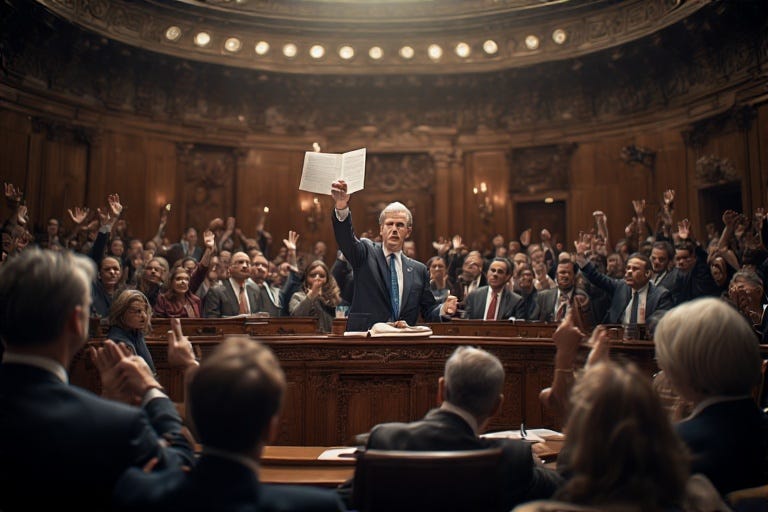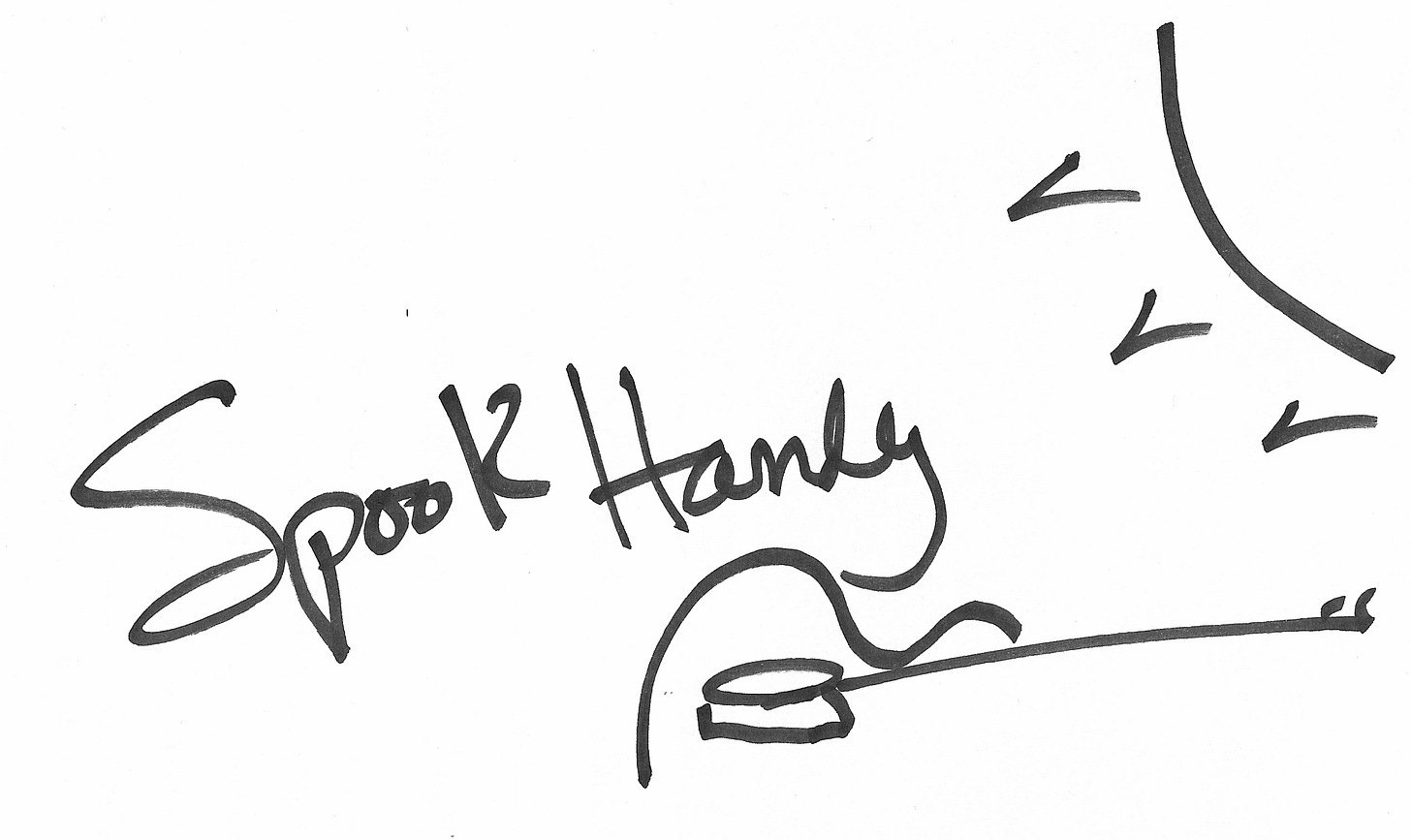Spook News: I will be playing at the Corn Festival in Beacon, NY on Sunday, Aug 10. Meanwhile …
In What is a “Law” Anyway? - part 1, Paul Mugwart explained that Scientific, Mathematical, and Logic Laws describe how Physics, Math, and Logic work. The Moral Code, ethics, and bylaws describe how we need to act for society and other communities to work. In a future episode, Paul will tell us about Spiritual Law and how it differs from Metaphysics and the Moral Code. We pick up here with me asking:
Spook: Can you tell us about Civil Law?
Paul: Civil Law and Common Law are man-made. Let’s not worry about the distinction between the two for now. Instead, let’s compare and contrast man-made laws with the Moral Code.
CIVIL LAW AND THE MORAL CODE DIFFER
The two overlap, but man-made laws have the “force of law” behind them. If you violate the Moral Code, you might create karma, or what some people call “sin.” If you violate Civil Law, you could end up in jail or in debt.
The difference can be seen in the example of “coveting.” Moral Codes list coveting your neighbor’s spouse as a violation. But what is the civil penalty for that? You may get “in trouble” with “the man upstairs,” but unless man-made law outlaws what goes on in your head, you will not go to jail for the moral infraction.
An example at the opposite extreme is someone sleeping dead drunk in the driver’s seat of their car with the key in the ignition. It’s doubtful that this is morally wrong, and in fact, it may be the wisest course of action if they’re too drunk to drive and have nowhere else to sleep. But, according to man-made law, they can lose their driver’s license and face a heavy fine for doing so. So, civil law differs from moral law because it has the force of law behind it.
KNOWING THE DIFFERENCE IS IMPORTANT
Understanding this difference is paramount to understanding what a law is, in the first place. You may be doing nobody harm by sleeping drunk in your car, thus violating no morals. But society deems it necessary to draw the line somewhere on drunk driving. And the reasoning goes that drunk driving is so dangerous and kills so many innocent people that the line must be drawn very far from the actual offense. The law, in essence, says, “Don’t even think about getting in the driver’s seat of your car if you are drunk.”
Spook: You once said that Civil Law has gone astray.
Paul: In many ways, it has. Ideally, civil laws are similar to moral laws because they describe how to behave for society to work. That’s why they overlap. And we’ve already pointed out that Civil Law has the force of law behind it. But there’s a second way to describe the difference between the two.
CHURCH vs STATE
It’s a gross simplification, but we can say moral laws are determined by “the Church” (whether that be Moses, the Vatican, an Imam, or whomever) and civil laws are determined by the people. It’s the sacred versus the secular. This is another hugely important distinction that needs to be recognized if a society is going to survive.
To determine Civil Law, ideally, the people send a bunch of smart, introspective, life-experienced “experts” into a room to figure out what laws need to be made for society to work. They figure out that society will break down if we allow murderers to get away scot free. Kids can get hurt if we allow drivers to go 70 miles per hour in a school zone. The planet will burn up and spit us humans off if we continue to pour methane and carbon into the air. So we create “man- (and woman-) made laws” to regulate these behaviors.
CIVIL LAW GONE ASTRAY
Spook: But …
Paul: But sometimes the wrong people make the civil laws. They consider factors they shouldn’t consider. Instead of being selfless as Moses is purported to have been, some of them ask, How can I make money on this? How can I gain power? How can I impose retribution on my political rivals? How can I score a higher ranking in the Fortune 500?
Spook: How can I Make Americans Genuflect Again?
Paul: At times, society is better off if we appease a particular interest group, but often, society is hurt by it. Again, it boils down to asking how we can best make society work.
Spook: How does it work?
HONEST BROKERS
Paul: First and foremost, citizens need to make honest efforts to put honest people into positions to devise man-made laws and honest experts to devise regulations.
Spook: Are you saying we need medical experts in charge of health decisions, environmental scientists in charge of the environment, military experts in charge of the military, etc.?
Paul: Ideally, to devise what works best in any particular field, you not only have to be honest, but you need to know how things work in that field.
Again, the bottom line is How do things work? I can’t stress that enough. It’s worth repeating over and over. How do things work? Don’t forget that, for it is one of the keys to the survival of a society. Laws must be made with an honest goal of devising what works best.
Ask, how will our national health system work best? Not what will sell more vitamins? Ask how our moral obligation to be good stewards of the Earth will be best met? Not how can we steer the economy to be more dependent on a limited resource that we can control and profit from? By this criterion, the most qualified people to decide these laws need to be honest, disinterested, and knowledgeable.
DISINTERESTED BROKERS
Spook: Disinterested?
Paul: Yes. Not “UNinterested.” That means you don’t have an intellectual interest. “DISinterested.” That means you don’t have a business interest – you don’t stand to gain or lose financially by the decisions you make.
Spook: There are a lot of lawmakers who exhibit selfish motives.
Paul: Selfish lawmakers reflect the selfish motives of the people who put them in power. There can be honest disagreement about what works best. But more often, dishonest people are put into power by selfish voters. Too many voters want laws they believe will benefit themselves and deny “those people” benefits at the same time.
Spook: It seems that today's lawmaking is more about power than about doing what’s best for society.
Paul: We need to consider the Love of Power versus the Power of Love. The first case occurs when you bend facts, distort truths, tell straight-out lies, and cross other moral boundaries to create laws that benefit you and yours. The latter occurs when you love your fellow human beings and God’s creation enough that you put their welfare ahead of your own.
Spook: How do we get back to the Power of Love?
… To be continued.
Meanwhile, before we go, I am reminded of a verse and a half from “America the Beautiful.” It’s worth pondering:
O beautiful
for heroes proved
In liberating strife
Who more than self
their country loved
And mercy more than life!
America! America!
May God thy gold refine
Till all success be nobleness
And every gain divine!
And then there’s this half verse:
America! America!
God mend thine every flaw
Confirm thy soul in self-control
Thy liberty in law!
Keep the Flame (of Democracy) Alive!
Your support allows me to continue singing these songs and writing this series. If you find value in this work, please consider upgrading to a supporting subscriber. This way, I can keep “Looking for America” free for those who cannot afford it, and continue writing and giving concerts of hope and optimism, especially in these challenging times when a clear path through the darkness is not always easy to see.



